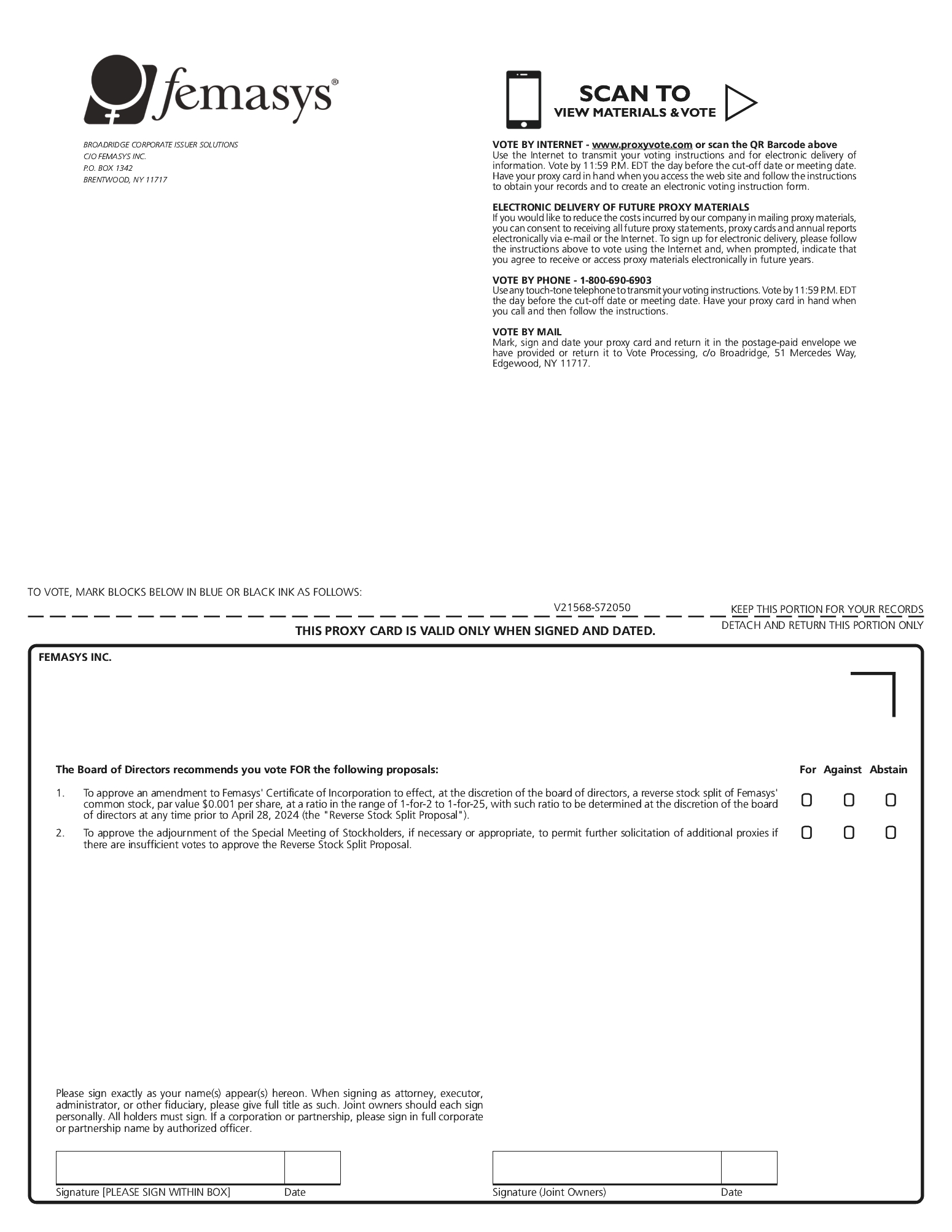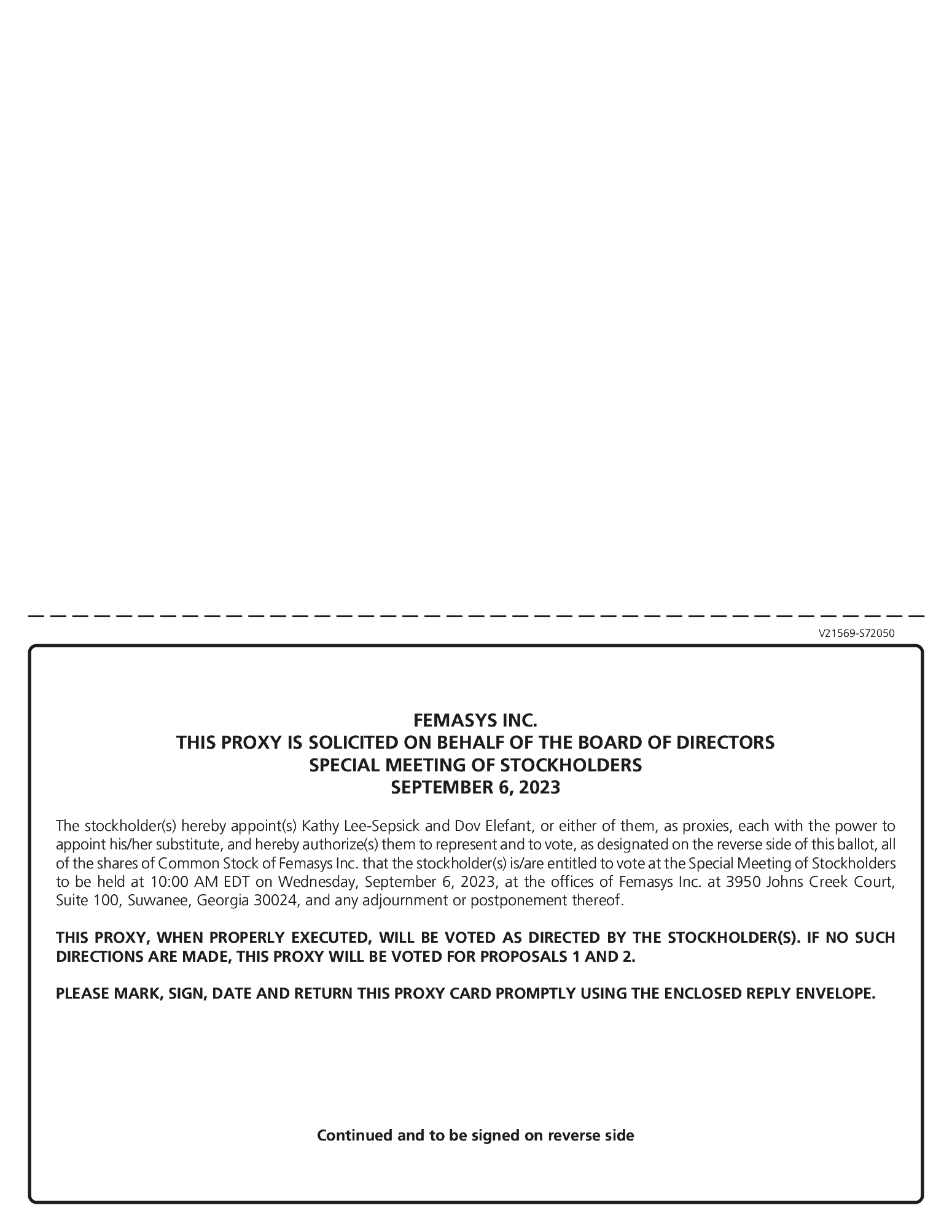Exchange Act and Stock Listing. After the Effective Time, we would continue to be subject to periodic reporting and other requirements of the Securities and Exchange Act of 1934, as amended (the “Exchange Act”), and the common stock would continue to be listed on Nasdaq under the symbol “FEMY.”
New CUSIP Number. After the Effective Time, the post-Reverse Stock Split shares of common stock would have a new CUSIP number, which is a number used to identify our equity securities.
Effectiveness of Reverse Stock Split. The Reverse Stock Split, if approved by stockholders, would become effective upon the date determined by the board of directors and upon the filing of a Certificate of Amendment to our Certificate of Incorporation with the Secretary of State of the State of Delaware. It is expected that this filing will take place shortly following the Special Meeting, assuming the stockholders approve the Reverse Stock Split Proposal. However, the exact timing of the filing of the Certificate of Amendment will be determined by the board of directors based on its evaluation as to when such action will be the most advantageous to the Company and our stockholders. In addition, the board of directors reserves the right, notwithstanding stockholder approval and without further action by the stockholders, to elect not to proceed with the Reverse Stock Split Proposal if, at any time before the Effective Time, the board of directors, in its sole discretion, determines that it is no longer in our and our stockholders’ best interests to proceed with the Reverse Stock Split Proposal.
Effect on the Company’s Stock Plans. As of July 28, 2023, we reserved approximately 1,041,818 shares of common stock in connection with our Plans and equity awards. Under the terms of the Company’s Plans, the Compensation Committee or the board of directors, as applicable , may, in its sole discretion, make equitable adjustments to the Plans in order to prevent dilution or enlargement of the benefits available under the Plans, which may include adjustments to the aggregate number and kind of shares that may be issued under the Plans, the number and kind of shares or other property (including cash) to be issued upon the vesting or exercise of an outstanding awards granted under the Plans and the purchase price thereof (as applicable). In accordance with such provisions in each of the Plans, upon implementation of the Reverse Stock Split Proposal, the Compensation Committee or the board of directors, as applicable, is expected to make certain equitable adjustments to the number of shares issuable upon the vesting of outstanding restricted stock units, per share exercise price and the number of shares issuable upon the exercise of stock options under the Plans and proportionately adjust the aggregate number of shares reserved for issuance and the aggregate number of shares that may be issued pursuant to equity stock options based on the Final Ratio determined by the board of directors. In addition, pursuant to the authority provided under the Plans, the Compensation Committee or the board of directors, as applicable, is expected to authorize the Company to effect any other changes necessary, desirable or appropriate to give effect to the Reverse Stock Split Proposal, including any applicable technical, conforming changes to our Plans. The Compensation Committee or the board of directors will also determine the treatment of fractional shares subject to stock options and other outstanding awards under the Plans.
Effect on Authorized but Unissued Shares of Common Stock. Currently, we are authorized in our Certificate of Incorporation to issue up to a total of 200,000,000 shares of common stock. The total number of authorized shares of common stock will not change as a result of the Reverse Stock Split. As of July 28, 2023, we had 15,073,153 shares of common stock outstanding and 117,223 shares of common stock held in treasury. As described above, the Reverse Stock Split would have the effect of reducing the number of outstanding shares of common stock, the number of shares of common stock held in treasury, and the number of shares of common stock reserved for issuance pursuant to our stock plans. Therefore, because the total number of authorized shares of common stock will not change as a result of the Reverse Stock Split, upon the effectiveness of the Reverse Stock Split, the number of authorized shares of common stock that are not issued or reserved for issuance would increase. All authorized but unissued shares that are not reserved for issuance would remain available for issuance by the board of directors for general corporate purposes, at its discretion, without stockholder approval. If the board of directors were to authorize the issuance of any such shares, such issuances could dilute the ownership interests of holders of common stock and may also cause a decline in the trading price of our common stock.
Effect on Preferred Stock. The Reverse Stock Split will not affect the authorized number or par value of the shares of preferred stock of the Company (the “Preferred Stock”), which will remain at 10,000,000 and $0.001, respectively.
Effect on Common Stock Warrants. If the Reverse Stock Split is effected, proportionate adjustments are generally required to be made to the per share exercise price and the number of shares issuable upon the exercise


